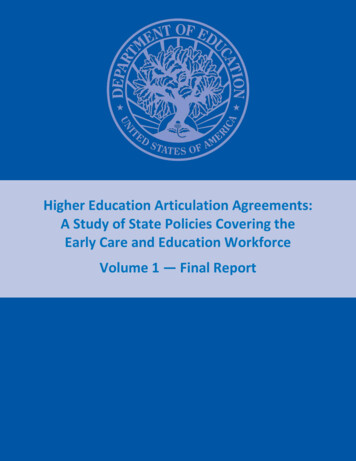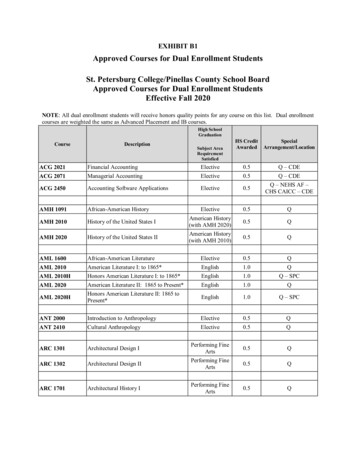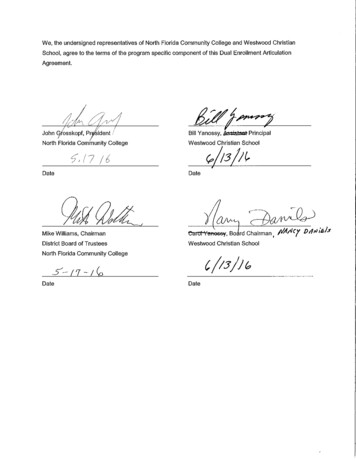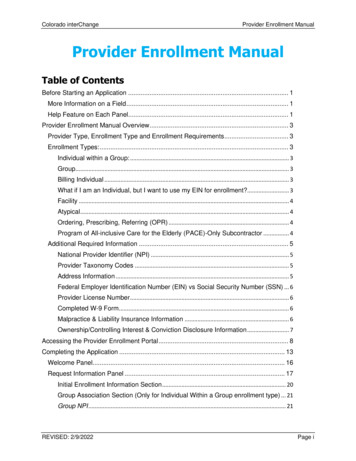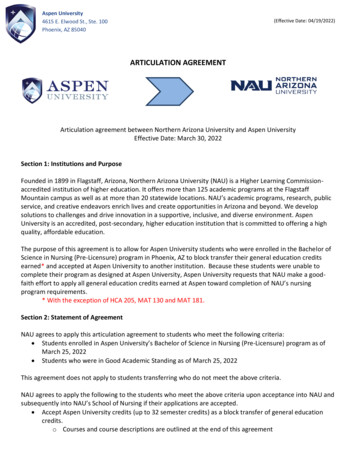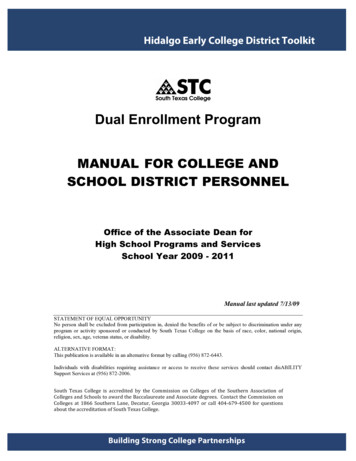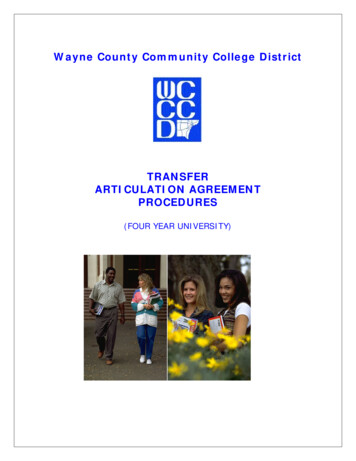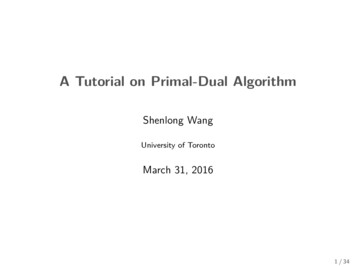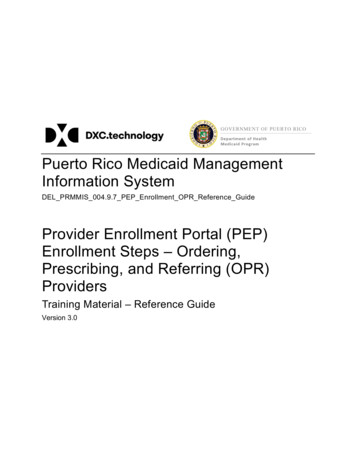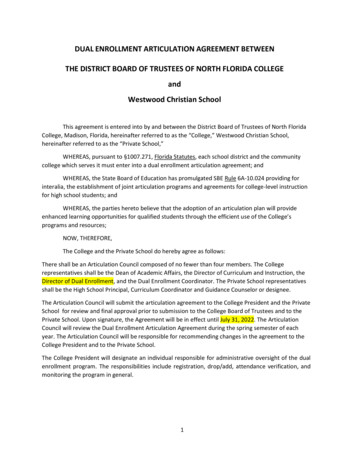
Transcription
DUAL ENROLLMENT ARTICULATION AGREEMENT BETWEENTHE DISTRICT BOARD OF TRUSTEES OF NORTH FLORIDA COLLEGEandWestwood Christian SchoolThis agreement is entered into by and between the District Board of Trustees of North FloridaCollege, Madison, Florida, hereinafter referred to as the “College,” Westwood Christian School,hereinafter referred to as the “Private School,”WHEREAS, pursuant to §1007.271, Florida Statutes, each school district and the communitycollege which serves it must enter into a dual enrollment articulation agreement; andWHEREAS, the State Board of Education has promulgated SBE Rule 6A-10.024 providing forinteralia, the establishment of joint articulation programs and agreements for college-level instructionfor high school students; andWHEREAS, the parties hereto believe that the adoption of an articulation plan will provideenhanced learning opportunities for qualified students through the efficient use of the College’sprograms and resources;NOW, THEREFORE,The College and the Private School do hereby agree as follows:There shall be an Articulation Council composed of no fewer than four members. The Collegerepresentatives shall be the Dean of Academic Affairs, the Director of Curriculum and Instruction, theDirector of Dual Enrollment, and the Dual Enrollment Coordinator. The Private School representativesshall be the High School Principal, Curriculum Coordinator and Guidance Counselor or designee.The Articulation Council will submit the articulation agreement to the College President and the PrivateSchool for review and final approval prior to submission to the College Board of Trustees and to thePrivate School. Upon signature, the Agreement will be in effect until July 31, 2022. The ArticulationCouncil will review the Dual Enrollment Articulation Agreement during the spring semester of eachyear. The Articulation Council will be responsible for recommending changes in the agreement to theCollege President and to the Private School.The College President will designate an individual responsible for administrative oversight of the dualenrollment program. The responsibilities include registration, drop/add, attendance verification, andmonitoring the program in general.1
1. Ratification or modification of all existing articulation agreements.This agreement shall be in effect from the date of entering into this agreement until July 31,2022. It shall replace all previous dual enrollment articulation agreements between the parties.2. A description of the process by which students and their parents areinformed about opportunities for student participation in the dualenrollment program.It is the responsibility of the Private School to inform students of the availability of the dualenrollment program, requirements, and currently offered courses through educationalplanningand guidance process. Each school will advertise dual enrollment through a variety ofmethods. The Private School shall inform all eligible secondary students and their parents ofdual enrollment as an educational option, including eligibility criteria and the process by whichstudents and parents exercise their option to participate.NFC shall work with the Private School to provide a live schedule of classes on the NFC websiteand will be available to communicate directly with parents and students about dual enrollmentoptions. For information about NFC’s Dual Enrollment program call the Office of DualEnrollment at 850-973-1628 or 850-973-9490.The Private School will allow College personnel reasonable access to the schools and studentsfor purposes of program information and dissemination. The district will provide staff to assistCollege personnel with facilities and requested instructional equipment.3. A delineation of courses and programs available to students eligible toparticipate in dual enrollment.For the purposes of the dual enrollment articulation agreement, the programs articulatedunder this agreement include:A. Dual Enrollment §1007.271, Florida Statutes1. Section 1007.271(1) of Florida Statutes says that a “dual enrollment program isthe enrollment of an eligible secondary student or home education student in apostsecondary course creditable toward high school completion and a careercertificate or an associate or baccalaureate degree. A student who is enrolled inpostsecondary instruction that is not creditable toward a high school diplomamay not be classified as a dual enrollment student.”2
2. Students are permitted to enroll in these programs in fall and spring termsduring schoolhours and after school hours. In addition, eligible secondary schoolstudents shall be permitted to enroll in eligible courses regardless of deliverymethod. Any student so enrolled shall be exempt from the payment ofregistration, matriculation, and laboratory fees.3. Part time Dual Enrollment may take up to 11 credit hours per term.B. Early Admission Dual Enrollment, §1007.271(10), Florida StatutesEarly admission is a form of dual enrollment through which eligible secondary studentsenroll in a post-secondary institution on a full-time basis [minimum of 12 credit hoursand a maximum of 15 credit hours per term] in courses that are creditable toward thehigh school diploma and the associate degree. Students who wish to register for morethan 15 credit hours per term need permission of the Dean of Academic Affairs.C. Career Dual Enrollment, §1007.271(7), Florida Statutes1.Career dual enrollment was established by the Legislature as a positive measureto expand the scope of the dual enrollment program. Students may take up to330 vocational clock hours per term part time Career Dual Enrollment.2.This type of dual enrollment shall be provided as a curricular option for eligiblesecondary students to earn industry certifications pursuant to 1008.44, FS whichcount as credits toward the high school diploma.3.For 2021-2022, CWE (Career and Workforce Education) programs available foreligible secondary students are Advanced Manufacturing and ProductionProgram (AMPT), and CMS Correctional Basic Recruit Training Program.D. Career Early Admission, §1007.271(11), Florida StatutesCareer early admission is a form of career dual enrollment through which eligiblesecondary students enroll full-time (361- 480 clock hours per term) in postsecondaryprograms leading to industry certifications, as listed in the Postsecondary IndustryCertification Funding List. Students who wish to register for more than 480 vocationalclock hours per term need permission of the Dean of Academic Affairs. “Participation inthe career early admissions program is limited to students who have completed aminimum of 4 semesters of full-time secondary enrollment, including studiesundertaken in the ninth grade” per Florida Statute section 1007.271(11). For 20212022, CWE (Career and Workforce Education) programs available for eligible secondarystudents are Advanced Manufacturing and Production Technology Program (AMPT) andEarly Childhood Professional Certificate (ECPC).E. Collegiate High School Program, §1007.273, Florida StatutesThe collegiate high school program is an option for public school students in grades 113
or 12 to participate in the program for at least 1 full school year, to earn CAPE industrycertification pursuant to §1008.44, and to successfully complete 30 credit hoursthrough the dual enrollment program under §1007.271 toward the first year of collegefor anassociate degree while enrolled in the collegiate high school program.North Florida College encourages students who wish to enroll in college credit coursesto concentrate on general education courses. Students who intend to earn anAssociatein Arts or Baccalaureate degree should carefully evaluate each course todetermine its applicability to meeting degree requirements. College Credit Courses aredefined as those courses that meet requirements for Advanced Technical Diplomas,College CreditCertificates, Associate in Arts, and Associate in Science.Dual enrollment courses may be taken at the College or at the high school site or atany location where college courses are taught, subject to approval by the high schoolguidance counselor or designee. In addition, eligible secondary school students shall bepermitted to enroll in eligible courses regardless of delivery method.4. A description of the process by which students and their parents exerciseoptions to participate in the dual enrollment program.The high school will promote the dual enrollment program by informing students and theirparents about the ramifications of taking college credit courses while in high school. The highschool will provide parents and students who may be eligible to take dual enrollment coursesthe eligibility criteria to apply and register for College courses. Students will be responsible forcompleting the dual enrollment applications and returning the completed application to thehigh school counselor. The high school counselor will submit dual enrollment applications tothe NFC Dual Enrollment Coordinator. Students will register for classes through their highschool counselor; they may not register online or directly through NFC staff.Application Process for New Dual Enrollment StudentsStep 1: Meet with your high school guidance counselor to determine dual enrollment options.Step 2: Meet required assessment testing (Appendix D).Step 3: Complete the NFC dual enrollment application and give to your high school guidancecounselor. Requires parent signature.Step 4: The high school counselor will submit dual enrollment applications to the NFC DualEnrollment Coordinator by August 1 for Fall 2021 and December 1 for Spring 2022. Completedapplications will include the NFC application and test scores. The high school guidance willconfirm the student has the appropriate class standing and test scores to be eligible for dualenrollment prior to forwarding the application to NFC.4
Step 5: Meet with you high school guidance counselor to assist with signing up for theappropriate course.Step 6: Complete the NFC registration form. Guidance counselor signature required. Counselorwill submit form to NFC for registration during published registration period. Certain Careerand Workforce Education (CWE) programs have a separate application process. See anAcademic Advisor for details.Step 7: Confirm registration by logging into the NFC Information Network.Step 8: Complete college courses with a grade C or better.Withdrawing from ClassesStudents must contact their guidance counselor to withdraw from classes. The guidancecounselor will submit the withdrawal with required signature to the Dual EnrollmentCoordinator to withdraw a student from class. Withdrawing from a course after the drop/addperiod counts as an attempt and a final grade of “W” will be reflected on the student’s NFCtranscript.Maximum Age for Participation in Dual EnrollmentThe maximum age for participation in dual enrollment is 19. Student must not be over age 19bythe first day of fall semester to participate in dual enrollment for that academic year. Withextenuating circumstances, students may appeal the maximum age limit by submitting awrittenrequest to the Dean of Academic Affairs. The decision of the Dean is final.TestingFor dual enrollment purposes, high school students may test in the NFC Testing Center or LiveOak Location. Set up an appointment by calling 850-973-9451 (NFC Testing Center) or 386364-5093 (Live Oak Location) or emailing testing@nfc.edu. PERT Testing at the NFC TestingCenter or Live Oak Location is limited to twice each semester. If ACT and SAT scores are usedfor placement, individual student score reports are now required. See Appendix D forminimum score requirements.5. A list of an additional initial student eligibility requirements forparticipation in the dual enrollment program.An eligible secondary student is defined in §1007.271(2), Florida Statutes, as a student whois enrolled in a Florida public secondary school or a Florida non-public secondary school. Anon- public secondary school must be in compliance with §1002.42(2), Florida Statutes, andmust conduct a secondary curriculum pursuant to §1003.428 or §1003.4282, FloridaStatutes, in order for its students to be eligible to participate in a dual enrollment program.Confirmation of compliance must be provided to the College from the non-public institution.5
Evidence of compliance can be a letter attesting that the non-public school complies or thereceipt of actual documentation, i.e., catalogs, etc.Students must meet the following eligibility criteria: Be enrolled as a student in a Florida public or nonpublic secondary school (grades 612), or in a home education program. The College limits eligible students in grades 6-8to one course per semester. The number of semester hours that an eligible student ingrades 9-12 enrolls each term is at the discretion of the high school counselor. TheCollege recommends that eligible students in grades 9 and 10 limit coursework to twocourses per semester and students in grade 11 limit coursework to three courses persemester. Achieve and maintain, with no exceptions, an unweighted 3.0 high school grade pointaverage to enroll in college credit courses. Achieve and maintain, with no exceptions, an unweighted 2.0 high school grade pointaverage to enroll in career dual enrollment courses. Students must achieve a minimum score for reading, writing, and math preparationthrough submission of appropriate placement test scores pursuant to Rule 6A-14.064,Florida Administrative Code (F.A.C.). No student shall be enrolled in a college creditcourse on a dual enrollment basis unless the student has demonstrated adequatepreparation through submission of appropriate placement test scores in reading,writing and math. See Appendix D. Program admission requirements/exit requirements for CWE programs and other DEeligible limited access programs. The TABE can be exempted if the student meets cutscore on a college placement test (ACT, SAT, PERT, or CPT). Students are responsiblefor costs for placement and/or exit tests. Cannot be scheduled to graduate prior to the completion of the dual enrollmentcourse.The Private School is responsible for ensuring completion of requirements for graduationfrom high school for students approved for early admission. The admission criteria andGPA requirements are the same as regular dual enrollment.The student is responsible for applying for admission and meeting admission requirementsprior to the published deadlines. Incomplete applications will cause delays that mayprevent registration into the desired course or program.The high school guidance office is responsible for verifying that the student has earned therequired scores on the proper placement test(s) in order to register for a specific course(s).The guidance counselor or designee at the high school will sign the registration form toverify that the student is eligible to take the dual enrollment course(s).Students enrolling in dual enrollment courses must identify a postsecondary educationalobjective. The Office of Dual Enrollment will work closely with students and high schoolguidance professionals in the development of student academic and education plans.6
Students who enroll in college courses in the summer of their high school graduation mustdo so as degree seeking students rather than dual enrolled students unless the collegecourse begins and ends prior to their high school graduation date and contributes to therequirements necessary for high school graduation.6. A delineation of the high school credit earned for the passage of eachdual enrollment course.Any course that is contained within the common course numbering system shall be eligible ifnot specifically excluded by Florida Statute, State Board of Education Rule, District Board ofTrustees Policy, or District Board of Education Policy. The high school credit awarded may befound in the 2021-2022 Dual Enrollment Course - High School Subject Area Equivalency Listwhich is available at the Florida Department of Education 44/urlt/ACCAgenda-Feb2021-AppA.pdf2021-2022 Dual Enrollment Course-High School Subject Area Equivalency List (fldoe.org)The high school guidance office is responsible for dual enrollment students as to the courseswhich may be used to meet high school graduation requirements.7. A description of the process for informing students and their parents ofcollege-level course expectations.The Private School and NFC will work collaboratively to notify students and their parents ofcollege-level course expectations. The college requires all first-time dual enrollment studentsto attend Dual Enrollment Orientation Session provided by the college. The Collegerecommends all students be advised by an NFC academic advisor after earning at least 12credit hours.NFC will also inform students and parents of college-level course expectations using the coursesyllabus which is given to each student in each college-level course at the beginning of eachsemester. The Office of Academic Affairs shall determine course content in accordance withthe Southern Association of Colleges and Schools Commission on Colleges (SACSCOC) criteriaand select instructional materials. Course materials and class discussions may reflect topics nottypically included in secondary courses which some parents may object to for minors. Courseswill not be modified to accommodate variations in student age and/or maturity.8. The policies and procedures, if any, for determining exceptions to therequired grade point averages on an individual basis.NFC does not allow exceptions to the GPA requirement as specified in Section 1007.271, F.S.9. The registration policies/procedures for dual enrollment courses as7
determined by the postsecondary institution.Student must complete their registration form with their high school guidance counselor. Theform must be completed with all the required information about course reference numbers(CRNs). The completed registration forms will be given to the Dual Enrollment Coordinator whowill register the students for courses that are available at the time the form is received.Students with incomplete applications for admissions, which includes all required signatures,will not be allowed to register. Students will also not be registered if they are missing any otherpertinent information, such as test scores. The deadline for qualifying PERT scores for fall termis August 1. The deadline for qualifying PERT scores for spring term is December 1. It is theresponsibility of the high school to ensure that all student registrations and test scores are inthe Office of the Registrar prior to the published registration period. 2021-2022 Deadlines forHigh Schools are listed below.2021 - 2022 Deadlines for High SchoolsFall 2021(Classes: August 19 – December 7. Exams: December 8-13)Registrationbegins July 6Dual Enrollment Application DeadlineAugust 1Drop/AddAugust 19 – August 25Spring 2022(Classes: January 6 – April 27. Exams: April 28 – May 3)RegistrationDual Enrollment Application DeadlineDrop/AddTBADecember 1January 6 – January 1210. Exceptions, if any, to the professional rules, guidelines, and expectationsstated in the faculty or adjunct faculty handbook for the postsecondaryinstitution.NFC does not make any exception to rules, guidelines, or expectations for faculty members.Criteria for Accreditation:The selection, development, and retention of competent faculty at all academic levels are ofmajor importance to the educational quality of dual enrollment programs. The SouthernAssociation of Colleges and Schools Commission on Colleges (SACSCOC) criteria require thatNFC provide evidence that it has employed faculty members qualified to accomplish thepurposes of the program and the institution as well as fulfill the intent of SACSCOCaccreditation guidelines. Faculty must meet the requirements of SACSCOC criteria for academicand professional preparation. According to SACSCOC, requirements for faculty teachingassociate degree courses designed for transfer to a baccalaureate degree are as follows:8
doctorate or master’s degree in the teaching discipline or master’s degree with aconcentration in the teaching discipline (a minimum of 18 graduate semester hours in theteaching discipline). The credentials for all full- time and adjunct instructors in all programs willbe maintained in the office of the Chief Academic Officer.North Florida College will provide for the orientation, supervision, and evaluation of all fulltime and adjunct instructors. The Director of Curriculum and Instruction, with the involvement of the appropriatedepartment chair, will hold an orientation meeting for adjunct faculty. All adjunctfaculty teaching dual enrollment courses are required to attend.The Director of Curriculum and Instruction will meet with or email the adjunct facultyat least once each term for the purpose of discussing and clarifying institutionalpolicies and procedures as well as expectations.The Director of Curriculum and Instruction will partner the adjunct faculty memberwith a full-time faculty member in the same discipline who acts as a content “go to”person.The Director of Curriculum and Instruction will conduct periodic evaluations of theperformance of adjunct faculty members. Such evaluations may include classroomvisitations, assessment of instructional materials including tests and other measures ofstudent progress, and student evaluations of instruction. These evaluations will bemaintained in the Office of Academic Affairs.The faculty handbook is accessible through the NFC website. All faculty are expected toadhere to the professional guidelines, rules, and expectations therein.The student handbook is accessible through the NFC website. The student handbookdetails add/drop and withdrawal policies, student code of conduct, grading policies,critical dates, etc. All faculty are expected to adhere to the professional guidelines,rules, and expectations therein.Personnel Assignments: The Dean of Academic Affairs will be responsible for approving faculty to teach dualenrollment courses. The high school is responsible for providing the College ChiefAcademic Officer with the graduate transcripts of a resident faculty member that itdesires to put forward as a possible teacher of NFC courses. The faculty assigned to teach dual enrollment courses will meet SACSCOC criteria. TheCollege will collaborate with the School Board in making faculty appointments to teachdual enrollment courses at the high school. There will be an orientation for instructors assigned to teach dual enrollment courses.This will be part of the College preplanning activities and will be directed by theDirector of Curriculum and Instruction. The purpose of the orientation session will be to share important information andinstructional materials that will support and enhance teaching effectiveness.9
Instructional effectiveness throughout the district remains a high priority for theCollege.11. Exceptions, if any, to the rules, guidelines, and expectations stated inthe student handbook of the postsecondary institution which apply tofaculty members.The NFC student handbook does not state any exception to rules, guidelines, or expectationsfor faculty members.12. The responsibilities of the school district regarding the determination ofstudent eligibility before participation in the dual enrollment programand the monitoring of student performance while participating in thedual enrollment program.The high school will designate an individual responsible for serving as the contact person fordual enrollment. The high school will be responsible for the following administrative tasks: Identifying students who may be eligible for and benefit from dual enrollment;Verifying that the student is eligible to register for dual enrollment courses on the basisof documented placement test scores, high school GPA, and readiness for college.Ensuring that student registrations are in the Office of Dual Enrollment in accordancewith the published registration period.Assuring reasonable access to schools and students by College personnel for purposesof program information and dissemination.Providing staff to assist College personnel with facilities and requested instructionalequipment.Responding to requests for transcripts for dual enrollment students in a timely manner.Using College adopted textbooks and instructional materials.Adhering to the College calendar. (Appendix B)The evaluation of students and the assigning of grades are the prerogatives and responsibilitiesof the faculty member assigned to teach the class in which the students are enrolled. Themethod for determining the final course grade, including activities to be graded and theirrespective weighting shall be specified in the course syllabus and distributed to the student.Any unavoidable changes to the grading policies in the syllabus must be communicated inwriting to each student in the course. Instructors may assign only those grades specified in thecatalog. The instructor of record must assign all grades in a given course.All faculty at NFC send “early alerts” to academic advisors two times a semester when studentsare underperforming in class. The Dual Enrollment Coordinator will send the high schoolguidance office a copy of the unsatisfactory performance notice. If more information isneeded, the Dual Enrollment Coordinator will contact the instructor.10
If an emergency prevents the instructor from assigning final grades, the College departmentchair using original student records, course syllabus, and other appropriate information willassign final grades. Under such circumstances, a written explanation of the situation will beattached to the final grade roster.A student may not be registered in one course and attend another course. (Assuming validreasons for a change from the course for which the student registered, the Drop/Add Formmust be processed to reflect the actual situation; such paperwork must be processedimmediately, not at the end of the term.)Students who earn a grade of D, F, or WF will not be able to register the following semester.After a one semester “sit out”, the student may register with the approval of the high schoolcounselor or designee. Courses in which a grade of D, F, or WF is earned may be repeated onetime for grade forgiveness if approved by the high school counselor or designee and if thecollege GPA is 2.0 or higher.If a dual enrolled student withdraws from a college credit course and receives the grade of“W," the high school guidance counselor or designee makes the determination whether or notthe student registers the next term. Any student receiving a “W” grade in a course may repeatthe course with the approval of the high school counselor or designee. Students are ineligiblefor dual enrollment if the college GPA is below 2.0 or cumulative high school GPA is below 3.0.All grades, including “W” grades for withdrawal, count as course attempts and become part ofthe student’s college transcript; they may affect subsequent postsecondary admission andfinancial aid. As dual enrolled, the student is limited to two attempts per course.Eligible secondary students are entitled to participate in dual enrollment for a maximum of 70credit hours. Students requesting to dual enroll in excess of 70 credit hours will be required tosubmit a written request to the Dean of Academic Affairs. The decision of the Dean is final.Dual enrollment courses may be taken at the College or at the high school site or at any sitewhere college courses are taught, subject to approval by the high school guidance counselor.Students may lose the opportunity to participate in the dual enrollment program if they aredisruptive to the learning process. Procedure is outlined in NFC’s Student Handbook.Regular and consistent attendance facilitates student success. Absences beyond the equivalentof two weeks of class are considered to be excessive and thus may impact a student’s coursegrade. Typically, two weeks of class would be 4 class meetings for a three-credit hour courseon MW or TR. There are no “excused” absences. An absence is an absence, and students areresponsible for material covered during their absence. In addition, if there is no verifiableparticipation within the first week of the term, the student will be dropped from the class fornonattendance. This includes all methods of delivery. CWE programs may have specific11
attendance policies. See course syllabi for specific information.13. The responsibilities of the postsecondary institution regarding thetransmission of student grades in dual enrollment courses to the schooldistrict.The College will maintain official student records in the Office of the Registrar. The Office ofDual Enrollment will send student letter grades to the high school guidance office within ten(10) days of the last class day of the College term.The College and the Private School shall jointly assume responsibility for the implementationand enforcement of any rights and responsibilities that arise by the creation, maintenance anduse of any "records" and "reports" regarding any high school students enrolled in accordancewith all applicable laws, including but not limited to §1002.22, Florida Statutes. Each shall beresponsible for "records" and "reports" maintained, housed or stored by the respectiveinstitutions.14. A funding provision that delineates costs incurred by each entity.1. Florida Statute §1007.271(21)(n), Dual Enrollment Programs, requires school districts paythe standard tuition rate per credit hour to the College for dual enrollment instruction. Themethodology for determining student cost is outlined in Appendix C.2. The non-public secondary schools shall be held to the same statutory requirementsregarding tuition payment to the College as the school districts.3. For fall and spring terms, an invoice will be
College, Madison, Florida, hereinafter referred to as the "College," Westwood Christian School, hereinafter referred to as the "Private School," WHEREAS, pursuant to §1007.271, Florida Statutes, each school district and the community college which serves it must enter into a dual enrollment articulation agreement; and
